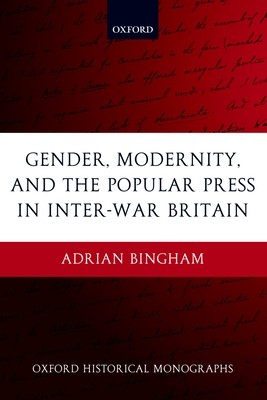
- We will send in 10–14 business days.
- Author: Adrian Bingham
- Publisher: Clarendon Press
- ISBN-10: 0199272476
- ISBN-13: 9780199272471
- Format: 15.6 x 23.4 x 1.8 cm, hardcover
- Language: English
- SAVE -10% with code: EXTRA
Gender, Modernity, and the Popular Press in Inter-War Britain (e-book) (used book) | bookbook.eu
Reviews
Description
Journalists often claim that they write the first draft of history, but few historians examine the press in detail when preparing later drafts. This book demonstrates the value of popular newspapers as a historical source by using them to explore the attitudes and identities of inter-war Britain, and in particular the reshaping of femininity and masculinity. It provides a fresh insight into a period of great significance in the making of twentieth century gender identities, when women and men were coming to terms with the upheavals of the Great War, the arrival of democracy, and rapid social change. The book also deepens our understanding of the development of the modern media by showing how newspaper editors, in the fierce competition for readers, developed a template for the popular press that is still influential today.
EXTRA 10 % discount with code: EXTRA
The promotion ends in 20d.16:40:37
The discount code is valid when purchasing from 10 €. Discounts do not stack.
- Author: Adrian Bingham
- Publisher: Clarendon Press
- ISBN-10: 0199272476
- ISBN-13: 9780199272471
- Format: 15.6 x 23.4 x 1.8 cm, hardcover
- Language: English English
Journalists often claim that they write the first draft of history, but few historians examine the press in detail when preparing later drafts. This book demonstrates the value of popular newspapers as a historical source by using them to explore the attitudes and identities of inter-war Britain, and in particular the reshaping of femininity and masculinity. It provides a fresh insight into a period of great significance in the making of twentieth century gender identities, when women and men were coming to terms with the upheavals of the Great War, the arrival of democracy, and rapid social change. The book also deepens our understanding of the development of the modern media by showing how newspaper editors, in the fierce competition for readers, developed a template for the popular press that is still influential today.


Reviews